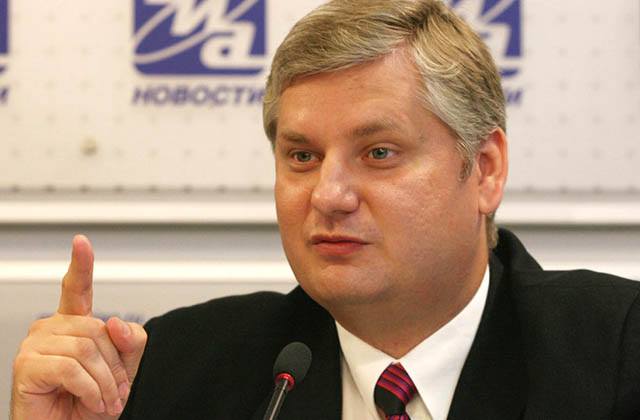“What is proposed by Moscow, frankly speaking, is beneficial neither to Yerevan, nor to Baku”

Interview with Sergey Markedonov, Director of the Department for Problems of Ethnic Relations at the Institute for Political and Military Analysis in Moscow, PhD in Historical Sciences, columnist, politician, expert of Russian Council on Foreign Affairs.
Mr. Markedonov, active diplomatic work followed the April war in Vienna, then in St. Petersburg, however, agreements reached during those summits haven’t been implemented. Moreover, currently the negotiations are at a grave deadlock, and situation on the contact line is considerably tense. What risks do you observe on NK conflict zone on account of last year’s tragic scenario on the contact line?
What happened last year made us become a hostage of this four-day war in some sense. Firstly, conflict escalation, wide-scale war wasn’t recorded. Secondly, what refers to negotiations prior to April 2016 and after it particular signs of success weren’t being recorded, moreover, the sides didn’t go to a compromise.
We can’t say that they were effectively negotiating, and were moving on the peace direction, and April developments pushed back that dynamics. Tension was observed both prior to April 2016 and before that.
Let me remind that in March 2008 the sides were insisting that it was the most serious escalation on the conflict zone, then in 2010, after it in December 2015, then in 2016.
On the whole the situation is the same, which may be qualified as dynamic status quo, i.e. base status quo is unrecognized NK Republic, whether good or bad, in form of negotiations, those negotiations are combined with ceasefire violations, incidents. On the whole, this line will proceed.
Do you observe a threat of wide-scale military operations under the current state of affairs?
I’m not sure whether repetition of the April war will be recorded or not. However, some incidents will be recorded, it’s clear, and currently they continue. Attempts to pass on dynamics to negotiations will also continue by mediators and diplomats, and out of various reasons, it’s necessary to the conflicting parties, and it’s necessary to the Co-Chairs.
How can diplomats develop negotiations, on account of unfavorable situation in the conflicting countries—pre-election atmosphere in Armenia, ongoing situation in Azerbaijan, certain tension in Russia-Azerbaijan relations as some experts prove?
I don’t observe considerable tension in Russia-Azerbaijan relations. There was complaint from the statement by Russian FM Sergey Lavrov, that Karabakh isn’t Azerbaijan’s internal affair, however, it’s on rhetoric level, and hardly other reflection on that level would have been recorded. As for diplomatic efforts, it’s necessary to clearly understand that diplomats can’t set unrealizable purposes and implement them. Foreign diplomats can’t stand between Armenians and Azerbaijanis and feel the scent of compromises.
Naturally, Karabakh conflict is a priority issue for Armenia and Azerbaijan, and for Russia, France and the USA—it isn’t, as a result of which mediators reflect to the topic when there is its need, not attempting to accelerate the situation, be ahead of situations, having fears that new risks will emerge. Thus, insisting that Moscow or Washington, or both, will leave their affairs and will start to resolve Karabakh issue, we should be realistic.
What’s Moscow’s role in NK conflict settlement? In December First RA president Levon Ter-Petrosyan mentioned in his speech that the key to NK conflict settlement is in Moscow. Where is the key to the resolution? Don’t you agree with this allegation?
Naturally, the key is in Yerevan, Stepanakert and Baku. I stated on this, and will state. If Armenia and Azerbaijan are not two independent states, but USSR member states, the situation would be different. However, currently the reality is different. Moscow may support, its role is immense, however it isn’t the only role in this conflict, Moscow isn’t the only factor of this conflict. They are numerous.
Which developments interest Moscow in NK conflict? Is this situation favorable to it?
Moscow is interested that the situation didn’t grow into chaotic, uncontrollable conflict, when logic of incidents is becoming the only directing factor. The point is, that any conflict and its settlement will be a compromise, and what is proposed by Moscow, let’s be frank, is beneficial neither to Yerevan, nor to Baku on the whole, as the proposal involves bilateral compromise, it isn’t news. They should comprehend this.
Should Moscow work instead of anyone? This isn’t the scenario. And as compromise isn’t so favorable to the sides, enough resources for pressure lack as well, and even if they exist, why should they be implemented? On account of this Moscow is led by the following logic: ”we shouldn’t allow the situation grow into uncontrollable conflict, then you should also be initiative.”
US Secretary of State Rex Tillerson stated prior to his appointment that he’d work with the authorities of Armenia and Azerbaijan to find NK conflict peaceful settlement, and that unresolved conflict is a threat to regional stability. In your opinion, what will be the position of the new administration and new Secretary of State, involvement in conflict settlement, and how will Moscow and Washington work in this issue?
What Mr. Rex Tillerson said is a ritual statement. Anyone instead of Tillerson would have done it. Involvement will be the same, as the topic isn’t an absolute priority for the USA.
As for Russia-USA cooperation in NK conflict settlement, it’ll be such as it has always been, NK conflict didn’t become a proxy conflict, and it isn’t a Russia-West confrontation platform, like Donbass and other conflicts. NK conflict had and has its logic, by which it develops.
By Araks Martirosyan

























